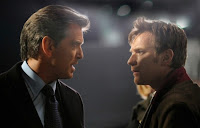 |
| Hold on, getting a poster of this in my room right now. |
According to some recent reports, Jack Nicholson has retired from acting. Then, according to some other reports, Jack Nicholson hasn’t retired from acting. I’m not sure which is true, but I really want to write this article.
It has been nearly three years since Nicholson has been credited in a movie and it doesn’t look like has any projects planned for the future. And at the Oscars this year he seemed, well, old (apparently, his retirement is due to memory loss). I’d love some more Nicholson but if he decided to call it quits now, he’d be leaving behind an amazing legacy. Besides maybe Daniel Day-Lewis and Paul Newman, few actors have had such consistent records. And most importantly, “The Bucket List” isn’t the last credit listed on his IMDB page.
So I don’t know if this is the end of his career or not but either way, it’s never a bad time to celebrate Jack Nicholson. Also, this is a really fun way to put off my homework.
Read On After the Jump: (Movies are sorted in order of the year that they came out).
Easy Rider (1969)
Before “Easy Rider” roared into theaters and announced that the hippies had taken over Hollywood, Jack Nicholson was getting a lot of small parts in a lot of B-movies which I still want to watch. “Easy Rider” wasn’t supposed to be much, but it subdued all expectations, as did Nicholson as alcoholic lawyer George Hanson. As George, Nicholson embodies Southern Hospitality. While he always seems a little sketchy, he is also nice enough to get a drink with. Nicholson burst with spontaneous little movements, giving the sense that he has as little control over his performance as George has over his own actions. Nicholson turned a small role into an Oscar nominated performance. It was the first of many to come.
Chinatown (1974)
Nicholson’s filmography reads like a list of some of my favorite movies of all time. Perhaps Nicholson’s performances were always so consistently outstanding during the 70s because he was given the best material that Hollywood had to offer. Yet, Nicholson made every character he played his own. As Jake Gittes, Nicholson churned out a snarky version of a film noir detective. While they would usually be a little more reserved and mysterious, Gittes was instead abrasive and sneaky in his snooping methods. “Chinatown” is one of the darkest movies ever made, yet not enough people seem to give Nicholson credit for being both the protagonist and the comic relief. You better believe that after watching “Chinatown,” you’ll know exactly how to “screw like a Chinaman.”
One Flew Over the Cuckoo’s Nest (1975)
Speaking of making characters his own, Nicholson did the same but this time with a character that had already been invented in literature. Nicholson makes R.P. McMurphy the gold standard for all Hollywood anti-heroes. From the second he enters the institution, jumping around and kissing doctors, he immediately lights up the room. Sure, he’s a repeated offender, but he’s so relatable because he’s so honest and real and doesn’t let anyone get the best of him. He’s the kind of person everyone wishes they were confident enough to be. He even stood up to Nurse Ratched. Now that was one scary lady.
The Shining (1980)
This most remarkable aspect of this horror classic is Stanley Kubrick’s direction. However, Nicholson’s performance is just as important, as it stays away from hamminess and instead he gives a frightening portrayal of one man’s descent into madness. Just like the entire movie, watching Nicholson is a slow build. It’s even more frightening because the motives are so hazy. Fun fact: the now legendary “Here’s Johnny!” line was improvised by Nicholson.
About Schmidt (2003)
This is one of Nicholson’s most un-Jack performances. Instead of just playing Jack Nicholson, he instead played Warren Schmidt, a schlubby Midwestern man who suddenly feels alone and useless after he retires from his job and loses his wife. It’s a quiet, understated performance that’s equal parts awkward, funny, and moving. It was another well deserved Oscar nomination for somebody who probably didn’t need another one, but deserved it anyway.
Guilty Pleasure: Anger Management (2003)- I’m sorry (but not really). This is the only time we’ll ever see Jack Nicholson sing “I Feel Pretty” on film. Don’t take this for granted, people!

